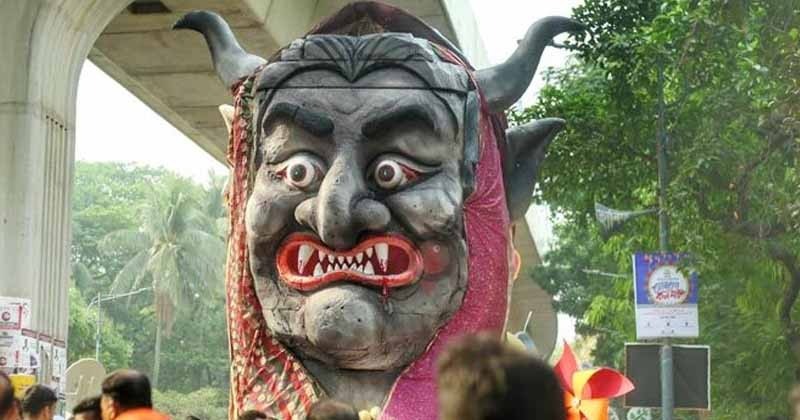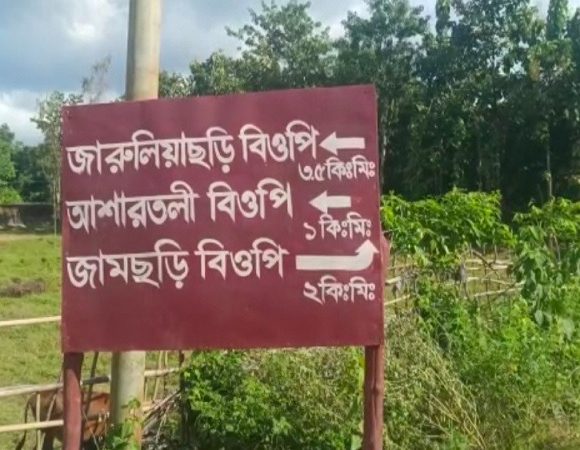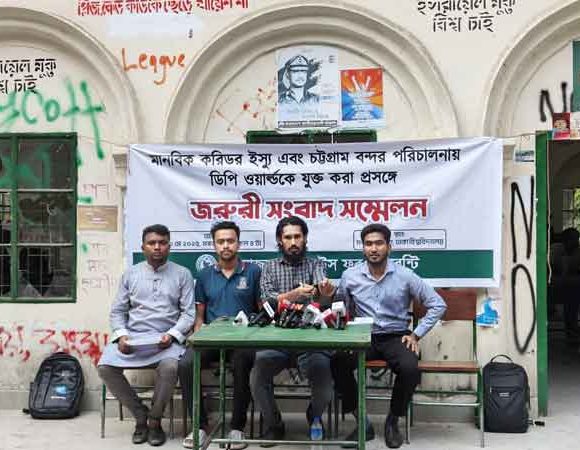Pahela Baishakh: Bangladesh marks New Year with call to end fascism

NEWS DESK
Amidst a shifting political landscape, this year’s Pahela Baishakh unfolded with a renewed vigour in Bangladesh, embracing both traditional festivity and powerful political symbolism.
The capital and other parts of the country buzzed with colour, music and hope as thousands of people came together to welcome Bangla New Year 1432, marked notably by the introduction of ‘Ananda Shobhajatra’, a new version of the iconic procession, carrying the theme “Nababarsh-er Oikotan, Fascibader Oboshan” — “The Harmony of New Year, End to Fascism.”
The morning of April 14 saw Dhaka University’s Faculty of Fine Arts become the epicentre of celebration and protest. From 8 am, preparations buzzed with energy, culminating in a grand procession led by Vice-Chancellor Prof Dr Niaz Ahmed Khan at 9 am.
Unlike previous years, when the Mongol Shobhajatra was the hallmark of Pahela Baishakh, this year’s ‘Ananda Shobhajatra’ not only kept the festive essence intact but also signalled a conscious departure from the past — both culturally and politically.
Large symbolic motifs took centre stage: a fierce ‘Fascist Face’, a white dove of peace, and even a watermelon motif symbolising solidarity with Palestine.
National icons such as the Royal Bengal Tiger and Hilsa also joined the parade, alongside an eye-catching 100-feet-long painting, horse-drawn carriages and decorated rickshaws.
However, the celebrations were not without drama. Two motifs, including the effigy of the ‘monstrous fascist face’ and the dove, were set ablaze in a suspected arson attack inside the university compound early Saturday.
CCTV footage revealed a man scaling the gate and igniting the artwork with flammable liquid.
Despite the setback, students and alumni rallied overnight to rebuild the motifs, showcasing defiant creativity in the face of attempted suppression.
Participants hailed the significance of this year’s Shobhajatra. Private university student Raju Ahmed remarked, “This year’s New Year celebration is a bit exceptional. It sends a message of ending fascism.”
Vice-Chancellor Prof Khan, speaking at a DU Journalists’ Association event, expressed his pride: “We never held such a big arrangement before… grateful to all for making the ‘Ananda Shobhajatra’ successful.”
Traditional Roots with Modern Spirit
Elsewhere, the day began in a timeless fashion.
At Ramna Batamul, cultural institution Chhayanaut held its signature New Year programme under the ancient banyan tree.
The theme, “Amar Mukti Aloy Aloy” (“My Liberation Lies in Light”), echoed through 24 soul-stirring performances celebrating light, nature, and patriotism.
Dr Sarwar Ali, Executive President of Chhayanaut, offered New Year greetings before the national anthem closed the event.
Performers, adorned in off-white and maroon, sang against a backdrop of matching decor, maintaining a visual and thematic coherence that drew applause from the large audience. The event was broadcast live on social media and national television channels.
DU Campus Turns Carnival Ground
Across the Dhaka University campus, a festive atmosphere reigned supreme. Young men and women in vibrant panjabis and sarees filled the streets, while traditional Nagordolas, toy trains and floral accessories brought joy to children and adults alike.
Cultural events at TSC, Bottala, and faculty venues continued throughout the day. Student organisations hosted performances, including a notable ‘Panta Bhoj’ under the Bottala tree by Bangladesh Ganatantrik Chhatra Sangsad.
DU student Nafisa Nuzhat shared her joy, saying, “I could buy beautiful accessories at reasonable prices. Many vendors are offering discounts today.”
Visitor Imran Hossain, visiting with family, said, “The festive atmosphere is really an uplifting one.”
Another visitor, Nafis Raihan from Old Dhaka, reflected, “This is the first Pahela Baishakh after the fall of autocracy. The Shobhajatra was more inclusive this year, representing voices from all sections.”
Bangla Academy’s Reflection on Identity and Youth
Meanwhile, Bangla Academy celebrated Pahela Baishakh with cultural and intellectual offerings at Nazrul Mancha, starting with music and followed by lectures and performances.
Faruk Wasif, in his keynote lecture, addressed generational change, connectivity, and cultural resistance. “Even villages are transforming in the age of smartphones. The urban-led New Year celebration, although middle-class in its core, unites Bangla speakers across regions.”
Prof Fazlul Haque, in his presidential remarks, called for “rejection of decayed old paths” and urged the nation to embrace new values.
The event also featured a book fair with major discounts on publications, drawing crowds of literature lovers.
Clashes in Chattogram
Not all events were celebratory.
In Chattogram, preparations at DC Hill were marred by an attack on Sunday night. Youths vandalised the stage and decorations, chanting anti-autocracy slogans. Police arrested six suspects linked to the attack.
CMP Deputy Commissioner Alamgir Hossain said, “Legal proceedings are underway. The allies of fascists were behind the attack.”
A New Year of Resolve
Pahela Baishakh 1432 arrived not just with songs and colours, but with a message — a celebration of unity and a call for peaceful resistance.
From Ramna to Shahbagh, Dhaka echoed with the spirit of renewal, setting the tone for a year where culture meets conscience and tradition walks hand-in-hand with transformation.

















